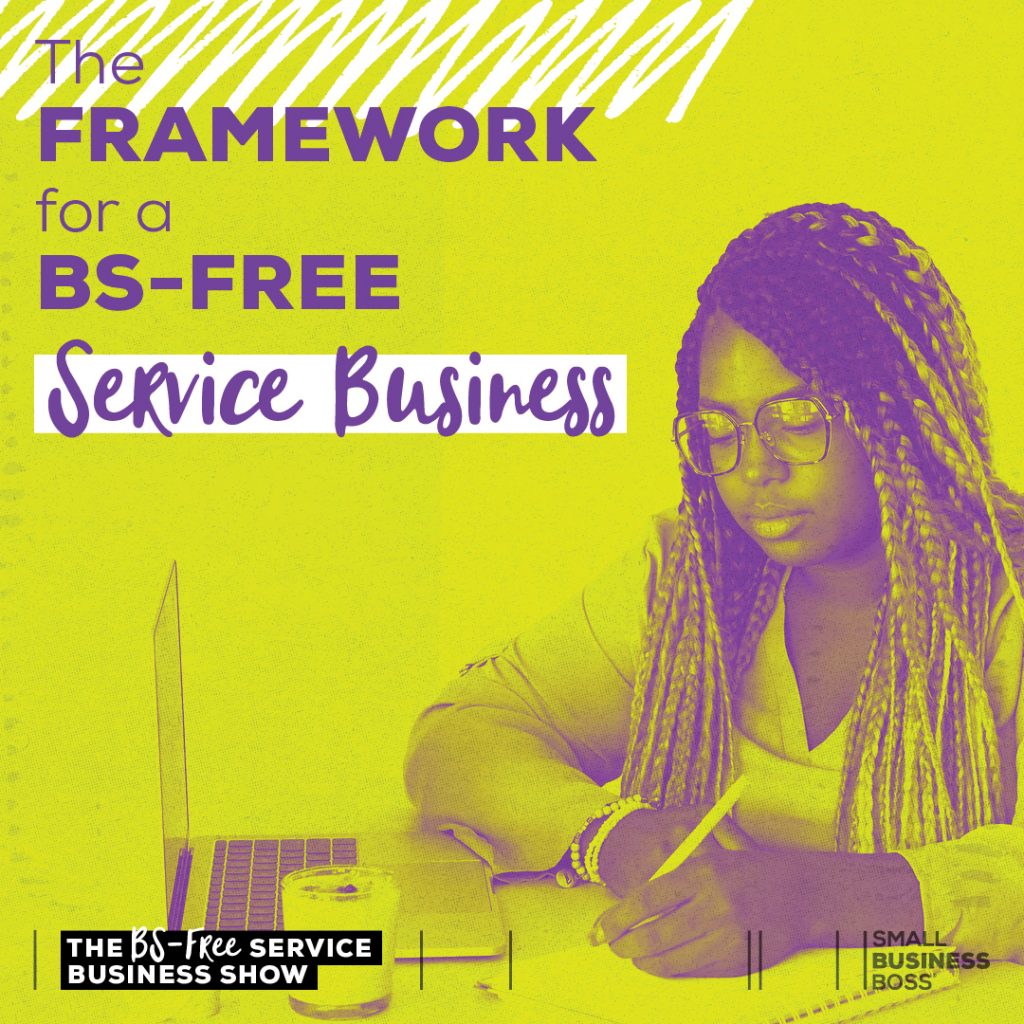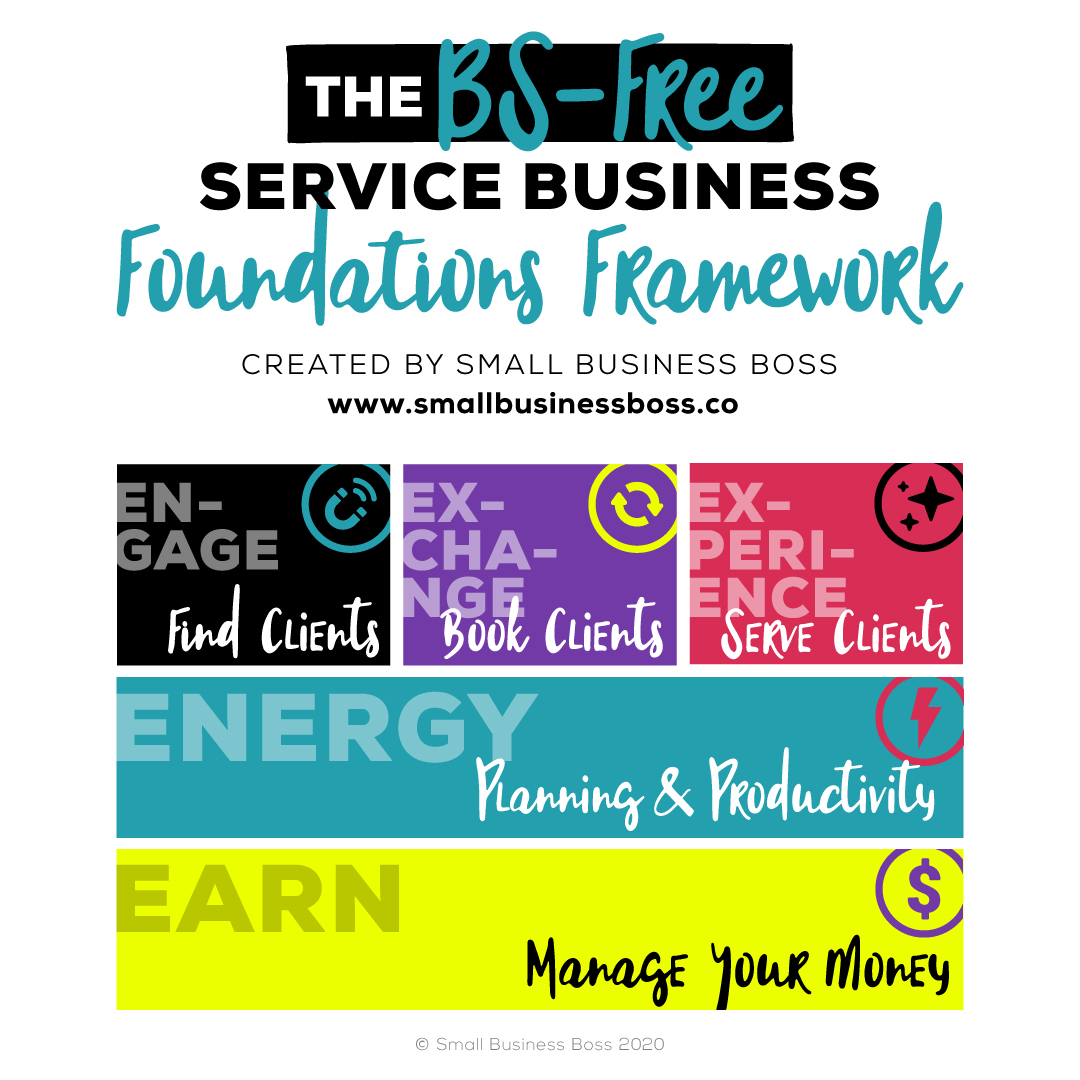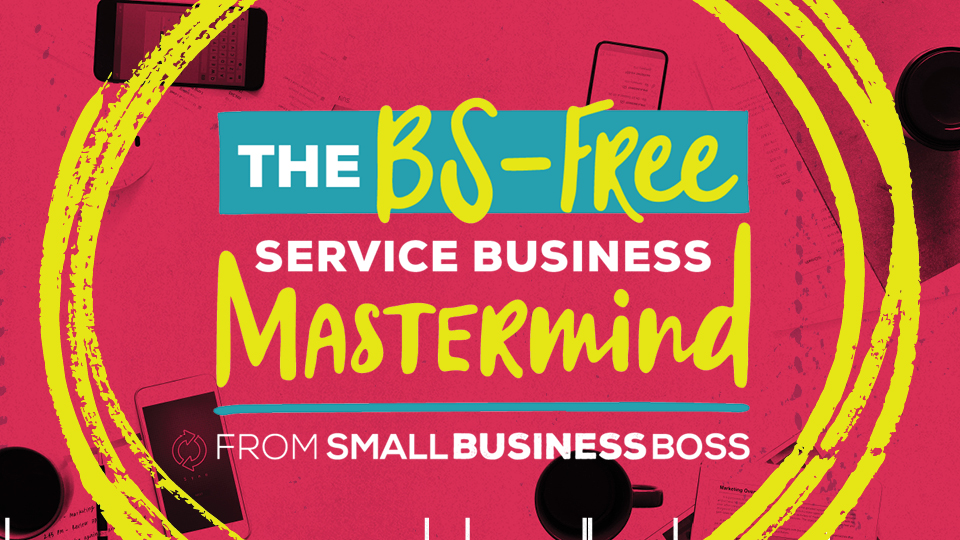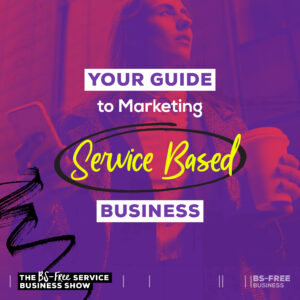
Search the site:
The Framework for a BS-Free Service Business
As bosses, many of us worry we’re missing something as we build our businesses, so the idea of using a specific business framework to do things can be incredibly appealing. Which is why in this episode and blog post, I’m walking you through the BS-Free Service Business Foundations Framework, and true to its name, it’s going to free you from a whole lotta busywork and BS.
So much of what’s targeted to us as bosses is designed to show us the “way” to build our businesses. Trust me when I say I get it. Many of us are planners and we want a path to help us get from point A to point B.
This is why roadmaps, playbooks, strategic plans and even secret formulas are so enticing. This is especially true when so many of us are worried we’re going to miss something important or screw up along the way and not create a strong business framework for the future.
And really, how could we not be concerned when everyday there are messages telling us that we NEED these insider secrets in order to make it.
Fancy Play Syndrome Keeps Us Stuck
Here’s the real secret. If you’re running a service-business, a lot of this is bullshit. You don’t necessarily need anything fancy in order to be successful.
My BFF Christine is a professional poker player, and in poker there’s this phenomenon called Fancy Play Syndrome. This is where a player opts to play a hand overly creatively, when a straightforward approach would win a lot more chips.
Many of the tools and techniques being sold to us are really and truly the online business equivalent of Fancy Play Syndrome. This is then compounded by two key factors.
First, entire businesses exist to sell us these tools and techniques. Businesses are built to help us build our businesses. Whether or not we really need these programs, courses or services, they’re marketed to us as solutions to our problems — instead of simply focusing on creating a robust business framework.
Which is great in theory, but many times, we don’t even know we have said problem until we’re told we do. These problems are manufactured as a way to make us think that we need something.
A great example of this is the idea that you should have a six-figure business. Let’s say you’re making $73k a year in your business and you’re not aware that making a $100k is even a goal to consider. In fact, you’re very happy with your current revenue.
However, you’re consistently confronted with the message that you’re selling yourself short if you aren’t making six figures. That you’re not living up to your full potential. Over time, some type of roadmap to show you how to get to $100k a year may become appealing as you think there’s something wrong with your business, when really there’s not.
Next up, it’s increasingly common for business owners to create a framework to show us how we could work together. Which is a great way to demonstrate how all the pieces fit together. (I mean, this is an episode about my framework, right?)
The problem comes when, as Brittany Berger from Work Brighter shared with me, people create a needlessly complicated process. Layers of complexity are added to show us where we may be missing something and to convince us that we need their help.
Remember a few episodes back when I talked about the celebrity entrepreneur archetype, the Intellectual Superior? This is their go-to move. They complicate everything, use big words and make us think they’re smarter than us. (Other archetypes do this as well, but the Intellectual Superior is the poster child for this move.)
All of this leads us to playing fancy, when really we need to stick to the basics of a good business framework. It leaves us thinking that to be the kind of boss we want to be, we have to do certain things in order to have a “real” business or to meet our goals.
The BS-Free Service Business Foundations Framework
Don’t laugh, but now we’re going to talk about the framework I’ve used for three years to show service business owners that we can run a relatively simple and streamlined business.
The goal of the BS-Free Service Business Foundations Framework is the EXACT opposite of fancy. It’s really about having a foundation that lets you discern what’s important, and what’s a shiny object.

Now, let’s walk through the business framework, which is built on the 5 Es:
Engage – Finding Clients
When your business is built on services, everything comes down to being able to find clients and market your business.
To engage potential clients, many times we think we need a lot of marketing, when really , we need specific, focused ways to find clients. For most of us, this means skipping over hyped up online marketing tactics (list building I’m looking at you) and picking a few key tactics that consistently deliver us new clients.
This may be anything from referrals to content marketing to cold outreach. Whatever you do when it comes to finding clients, be open to experimentation, and once you figure out what works, don’t spread yourself too thin. You don’t have to be everywhere, you just need to be in the right places.
Exchange – Booking Clients
Booking clients really comes down to handling three things which I call the three Ps: packages, pricing, and proposals:
- Packages mean you have a clear idea of exactly what you offer and the value you bring to your clients. Be specific, and get clear on what you offer; people hire experts — not people who offer everything and the kitchen sink.
- Pricing is one of the most powerful tools you have, so be sure you’re smart with your pricing. Don’t charge too little and leave money on the table.
- Proposals are often ignored, but your proposals matter more than you realize, so spend time creating a template that totally kicks ass. Let that proposal sell you as a solution to a problem instead of just providing a document with a scope of work and a price.
Much of the work you do here will be around sales so you’re able to get prospective clients to say yes. Which is why beyond the 3 Ps, you need to nail down your consult and closing game too.
When building your business framework, it’s crucial that you don’t make the sales process complex or convoluted for your potential clients. Think of this step as an audition for working together, so you need to make it feel stress-free for your clients.
Experience – Serving Clients
So much emphasis is placed on marketing and sales, when really, as a service business, we actually spend the majority of our time on experience, or serving clients.
This part of the framework means having systems in place that make both your life and your clients’ lives easier. This is everything from your onboarding to your client communications to your project management to dealing with sticky client situations.
Don’t make the mistake of fumbling the “in between” part for your clients. Most people are great at onboarding and offboarding, but what happens in the middle is critical to our ongoing client experience.
No matter how long you’ve been in business, experience should be a consistent, constant work in progress. As you think about this, it’s essential that you look at it from your client’s perspective as well. I’ve seen too many service providers try to systematize experience to the point that they lose the connection with the client.
Remember that ultimately, a service business is based on people working with people, so don’t neglect that in an effort to make things simpler for you or your team. Your client’s experience is crucial to your going ongoing success as a service business.
Energy – Planning & Productivity
Most service business owners I work with either think they’ve got planning and productivity on lock, or that they’re failing miserably.
For most of us, the truth is likely somewhere in between.
No matter where you land, for each of us to be successful, happy, fulfilled bosses, our planning and productivity needs to be directly tied back to our energy.
What I mean by that is that all the planning and productivity practices in the world won’t matter if they’re not a fit for you energetically. We’re all different, yet we’ve been sold this idea that how we plan and are productive is one-size-fits-all.
We read all the books and take all the training, yet we can be left struggling.
Case in point: The idea that you need a morning routine, preferably one that starts at 5 am. That doesn’t work for me. It makes me miserable. So I don’t do it. My morning routine is flexible and uncomplicated, which works best for me.
It’s worth noting that as service business owners, how we create a business framework, plan for our business, and manage our days needs to be different than someone running a coaching or course-driven business.
Which is why each one of us needs to set baseline systems in place for planning and productivity. Systems that work best for us and the way we like to work. Systems that serve our needs and support not just our businesses, but our lives.
For me, and many of my clients, this looks like planning on a quarterly basis, and having a monthly game plan. For productivity, this means focusing on a few key practices on a daily and weekly basis to maximize the work day, and more importantly, prioritizing what’s most important.
Earn – Manage Your Money
Learning to manage your money effectively is everything when you own a business. Unfortunately, this is one area where so many business owners struggle as there’s a lack of systems, or the ones they have in place are complete overkill.
A lack of money systems in place, such as budgets and up-to-date financials, can keep us stuck as we don’t have the structure or data that we need to make sound financial decisions. For years in my business I was afraid of managing money, and that held me back in many ways.
On the flip side, it’s easy to create systems around money that don’t serve us. While this is a less common challenge, once we start managing our money, it’s easy to get carried away. The result is too much time wasted on reports and financial info that we don’t need at our stage of business.
Learn what basic financials you need for your stage of business and then put simple systems in place to support them.
For example, if you’re a solo show, this may be having a weekly or monthly money date or a set day each month that you reconcile or review last month’s books. If you have a team, you likely need a bit more reporting in terms of contractor expenses and how profitable your offerings are.
The goal of your money systems isn’t to constrain you, but to help keep you on track so you have insight into what’s really going on. A firm grip on financial reality helps you make informed, factual decisions and saves you from telling yourself stories that aren’t even true.
Put the Foundations Framework into Action
By putting this business framework into action, you’ll be able to stay focused on the areas that matter most, and skip right over the fancy, frilly stuff that you don’t really need at all. You know, the BS that you don’t really need to be spending your precious time, energy or money on.
Even as your business grows, these five areas will continue to serve you, your team and your clients. As an agency owner, I consistently stick to these foundations and they never steer me wrong. Plus, they’ve saved me a lot of time, stress and money in the last 10 years.
If you want help working on and building the foundations for your business, my newest mastermind, the BS-Free Service Business Mastermind is now open. If you’re looking for a different kind of mastermind, this may be exactly what you’re looking for. Click on the image below to get all the details.

I’m Maggie Patterson (she/her), and services businesses are my business.
I have 20+ years of experience with client services, am a consultant for agency owners, creatives, and consultants, and vocal advocate for humane business practices rooted in empathy, respect, and trust.
Read or Listen to the Latest
For Solo Business Owners

Growing a solo service business is tough.
It’s even harder when you’re bombarded with BS advice that steers you away from your values and why you started your business in the first place.
This is the podcast for solo creatives and consultants who want to remain as a team of one and have zero interest in the hustle and grind of typical business teachings.
Subscribe now and never miss an episode.
For Micro Agency Owners
Most podcasts for agency owners obsess over revenue growth as the ultimate success metric.

But here’s the truth: not everyone wants to make millions. Your goal might be to build a sustainable business that lets you have a life and doesn’t run you into the ground.
Join me as I spill my shameless confessions and share everything I’ve learned about building a micro agency that skips the BS of tired and typical agency teachings.
Follow Now on All Major Podcast Platforms









